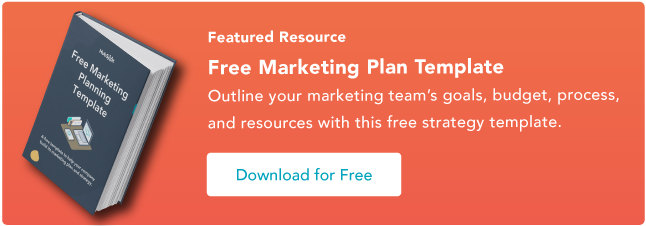Lead Source
In this blog post, we’ll review the definition of a lead source, why lead sources are so important, common types, and best practices for managing and tracking them.
Why do lead sources matter?
By understanding and identifying lead sources, you’re able to gain context around why and how your audience members find you. As a result, you can improve the customer experience and buyer’s journey with targeted content, communications, interactions, and more.
This allows you to determine which lead sources are most valuable to your business so you can hone in on them as well as measure your success over time in attracting and converting leads.
Additionally, knowing which lead sources bring in the most qualified leads helps you focus your resources where they matter most and where you’ll get the greatest ROI.
Identifying and understanding your lead sources is also a major part of lead management, the process in which you manage — or nurture — your leads until they decide to convert.
These are all details you need to improve the buyer’s journey, effectively target your unique audience, and shorten the sales cycle.
Types of Lead Sources
There are several types of lead sources. Here are some common examples.
- Email marketing (email campaigns)
- Organic search (lead sources from the search engine results page/ SERP)
- Paid ads (PPC, display ads)
- Social media
- Direct mail
- Referrals or word-of-mouth
- Gated/ premium content offers
- Blog articles
- Events (in-person or virtual)
- Backlinks (link from a page on one website to another — if another website links to your website, you have a backlink from them)
- Traditional advertising (billboards, TV, radio)
Next, let’s talk about a handful of best practices when it comes to your lead sources. You should keep these in mind while identifying, analyzing, and improving your lead sources.
1. Identify and track your lead sources.
If you’re looking to identify, track, and measure your lead sources, you’ll likely use a lead tracking tool. These tools are often part of your CRM, marketing software, or sales software.
Lead Source Tools
Here are some examples of powerful tools that can help you with lead source tracking.
1. HubSpot
HubSpot is an all-in-one CRM platform for scaling businesses with powerful marketing, sales, service, and ops software and tools. There’s more than one way to use HubSpot to collect, track, manage, and measure leads and lead sources.
For instance, with HubSpot CRM Lead Management and Tracking Software, all contact records for your leads are logged automatically. That includes all of your interactions and communications with those leads as well as all related sales activity — this provides insight into how, where, and when interactions with leads happened.
With HubSpot’s Marketing Hub, your Lead Collection and Tracking Software focuses more on leads and lead management within the marketing org so leads and lead data are readily available for the sales team.
This tool makes it easy to keep an eye on your lead’s email opens, content downloads, page visits, social media interactions, and more so you can track lead source data with ease. It also helps you organize all of your lead and contact information and interactions in a single database. You can segment your leads and score them based on qualification.
2. MoData
MoData is a sales analytics and revenue acceleration tool with pipeline reporting features that come with lead source tracking capabilities.
Pair this tool with your HubSpot CRM (using the integration) to compare your lead sources as well as your sales reps so your data and team members are aligned and on a central source of truth. View, send, and share out-of-the-box reports, as well as customize pipeline dashboards with ease.
3. CallRail
CallRail is a call tracking and marketing analytics platform that offers reporting for lead attribution by source. This feature uses multi-touch attribution to provide you with reports for every lead source and interaction type that your team cares about in CallRail, throughout every stage of the buyer’s journey.
View all of the lead sources you’re tracking in the tool — your top five lead sources are displayed in a graph with more details about your other sources below. You can view raw leads versus qualified leads as well as filter by company, time frame, and report model.
2. Determine which sources bring in the most qualified leads.
After identifying your lead sources, determine which of those sources bring in the most qualified leads for your business.
Again, a tool like HubSpot can help with this — it assists with tracking your leads and the sources by which they come from and then segmenting those leads based on an assigned lead score (which tells you how qualified they are).
In fact, HubSpot automatically scores your leads for you based on the criteria that you choose (based on behavior or characteristic). This is not only helpful for your marketing team but it also helps sales reps prioritize their lead follow-up.
3. Then determine which of those sources are converting the most leads into customers.
Once you’ve determined which sources bring in the most qualified leads, identify the source that converts the greatest number of leads into customers.
In other words, which lead source do you see the most customers coming from? Maybe it’s the source that you see the most qualified leads coming from, but maybe not. So, take some time to determine which lead sources you see the greatest number of new customers coming from.
4. Experiment with different channels to bring in more qualified leads.
Just because you know which channels and sources are currently bringing in the greatest number of qualified leads, and where the most conversions are currently coming from, doesn’t mean you can sit back and relax. As your business grows, your audience grows, too — and that evolving audience may not spend time exactly where your initial audience did.
Experiment with different channels to see how many qualified leads and conversions you can bring in. This experimentation may be how you surface your most valuable lead source.
5. Measure and analyze the success of your lead sources.
Measure the success of your lead sources over time. This is something you’re already going to be doing throughout the previous steps (e.g. scoring leads, identifying the most effective lead sources, etc.) but it’s also important to spend time here. In doing so, you’ll be able to ensure you’re focusing your resources in the right places.
The data obtained from your lead source analysis will also help you more effectively target, reach, resonate with, and convert your audience on the channels they like to use and via the touchpoints they like to interact with most. Remember, this part of the lead source management process should be ongoing.
Tap Into Your Lead Sources to Improve the Buyer's Journey
Begin identifying your lead sources to improve upon the buyer's journey with highly-tailored content, interactions, and communications, all via the channels and sources your audience prefers. Remember, the more you know about your audience, leads, and customers, the more effectively you can target and reach them.
Lead Generation



![What is a lead magnet? 20 lead magnet ideas and examples [+ step-by-step]](https://53.fs1.hubspotusercontent-na1.net/hubfs/53/lead%20magnet%20represented%20by%20a%20magnet.webp)




![Gated Content: What Marketers Need to Know [+ Examples]](https://53.fs1.hubspotusercontent-na1.net/hubfs/53/UNGated%20Content.png)

![What Is Demand Generation? Here’s How You Can Create Buzz for Your Offering [FAQs]](https://53.fs1.hubspotusercontent-na1.net/hubfs/53/demand-generation-1-20250321-225687.webp)

